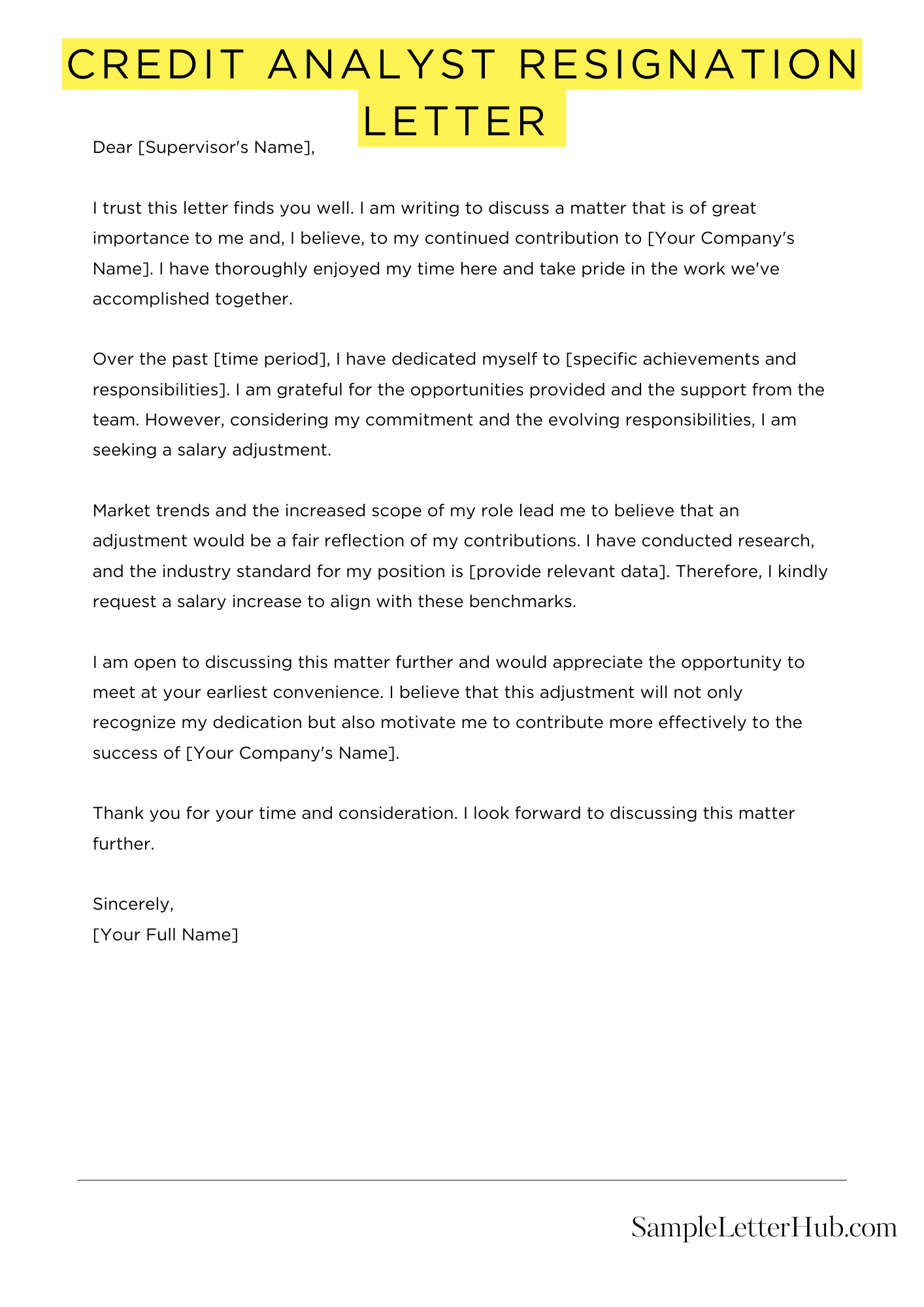Are you a credit analyst who’s ready to move on to new challenges? If so, you’ll need to write a clear and professional resignation letter. In this blog post, we’ll share an example of a credit analyst resignation letter that you can use as a template.
When writing your resignation letter, it’s important to be polite and humble. Thank your employer for the opportunity to work at the company and express your appreciation for their support. You should also state your last date of employment and offer to help with the transition.
Below, we’ve included a template that you can use to write your own credit analyst resignation letter. Feel free to adapt it to your own needs and circumstances.
Credit Analyst Resignation Letter
Dear [Recipient Name],
Please accept this letter as formal notification that I will be resigning from my position as Credit Analyst at [Company Name], effective [Last Date of Employment].
I have enjoyed my time at [Company Name] and am grateful for the opportunities and experiences I have gained during my tenure. I have learned a great deal and have developed valuable skills that I will carry with me in my future endeavors.
I would like to express my sincere appreciation for your support and guidance over the past [Number] years. I wish you and [Company Name] all the best in the future.
I will do everything I can to ensure a smooth transition during my departure. Please let me know if there is anything specific I can do to assist in this process.
Thank you again for the opportunity to work at [Company Name].
Sincerely,
[Your Signature]
Short Credit Analyst Resignation Letter Sample
Please accept this letter as formal notification that I am resigning from my position as Credit Analyst at [Company Name]. My last day of employment will be [Your Last Day]. Thank you for the opportunity to grow and learn during my time here. I wish you and the company continued success. I am happy to assist in the transition process to ensure a smooth handover of my responsibilities.
I wish you all the best with your credit analyst resignation letter.
When it’s time to say farewell, expressing your gratitude and best wishes can make the transition smoother:

How to Write a Credit Analyst Resignation Letter
Writing a resignation letter can be a daunting task, especially when you’re leaving a position that you’ve enjoyed. However, it’s important to remember that a resignation letter is an opportunity to leave a positive impression on your employer and colleagues.
Be Clear and Concise
Your resignation letter should be clear and concise. State your intention to resign from your position, and provide your last date of employment. You don’t need to go into detail about your reasons for leaving, but you can briefly mention them if you wish.
Express Gratitude
Take the time to express your gratitude to your employer for the opportunity to work at the company. Mention the things you’ve learned and the people you’ve worked with. This will help to leave a positive impression and show that you appreciate the time you’ve spent at the company.
Offer to Help
If you’re able to, offer to help with the transition during your notice period. This could include training your replacement or helping to complete projects. This will show that you’re committed to leaving the company on good terms.
Keep It Professional
Even though you’re leaving the company, it’s important to keep your resignation letter professional. Avoid being negative or critical of the company or your colleagues. Instead, focus on the positive aspects of your experience and express your gratitude for the opportunity to work there.
Proofread Carefully
Before you submit your resignation letter, proofread it carefully for any errors. Make sure that the grammar and spelling are correct, and that the tone is professional. You may also want to have someone else review it before you send it to your employer.
6 Most Frequently Asked Questions About Credit Analyst Resignation Letters
Credit analysts play a crucial role in the financial industry, assessing the creditworthiness of individuals and businesses. When it comes time to move on, it’s essential to craft a professional and effective resignation letter. Here are the six most frequently asked questions about credit analyst resignation letters, along with their answers:
1. What should I include in my resignation letter?
Your resignation letter should include the following key elements:
- A clear statement of your intent to resign
- Your last date of employment
- A brief expression of gratitude for the opportunity to work at the company
- Any necessary details about the transition, such as handover arrangements
2. How should I format my resignation letter?
Your resignation letter should be formatted in a professional business letter format. Use a standard font, such as Times New Roman or Arial, and keep the letter concise and to the point.
3. What should I say in my resignation letter?
While you should keep your resignation letter brief, it’s important to strike the right tone. Be professional and respectful, and avoid being negative or critical of the company.
4. When should I submit my resignation letter?
It’s generally advisable to give your employer at least two weeks’ notice. This gives them time to find a replacement and ensure a smooth transition.
5. What if I’m not sure what to say in my resignation letter?
If you’re struggling to write your resignation letter, there are many resources available online and from career counselors. You can also ask a trusted colleague or friend to review your letter before you submit it.
6. What should I do after I submit my resignation letter?
Once you’ve submitted your resignation letter, it’s important to maintain a positive and professional attitude. Continue to perform your job duties to the best of your ability, and assist with the transition in any way you can.
Before making the decision to resign from your job, it’s essential to consider the legal aspects:
Understanding your emotions after quitting your job is important. Explore why you might be feeling sad:
Related
- Resignation letter sample
- Forced resignation letter
- Resignation letter due to going abroad
- Resignation letter due to marriage
- Resignation letter due to other opportunity
- Resignation letter due to mistake

